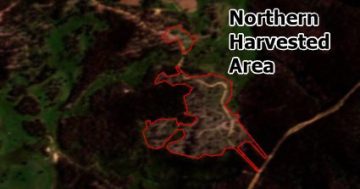
This map shows the areas at ‘Doolondondale’ in Kybeyan on which forestry operations took place in 2021. Photo: Land and Environment Court.
A farmer has been fined more than $110,000 over the illegal forestry operation that took place on his property south of Cooma.
The NSW Environment Protection Authority (EPA) took 66-year-old Michael James Green, who owned a farming property called ‘Doolondondale’ in Kybeyan, to the NSW Land and Environment Court before he pleaded guilty to three offences.
Justice Nicola Pain said native forestry operations were carried out by contractors in two areas on his property in 2021.
At least 8800 tonnes of pulpwood-grade timber and 985 cubic metres of sawlogs were harvested and the contractors sold the harvested products to timber suppliers.
But in December 2021, Green contacted Local Land Services (LLS) and raised concerns about the condition of the harvesting areas after the operations.
Dr Julian Wall, who has over 30 years’ experience in natural resource management, said as a result of unauthorised harvesting, basal area and tree retention thresholds were breached and the vegetation had changed to a sparse woodland structure.
“A substantial number of larger and older trees appear to have been harvested,” he said.
“The small quantity of habitat remaining in the post-harvested forest following the forestry operations would not have been sufficient to support many species of native animals that previously resided in the forest.
“In contrast, many of these species would have been able to persist if the unauthorised component of the forestry operations had not been carried out as there would have been enough canopy cover, foraging substrate, food sources, etc, to ensure their ongoing persistence while the forest recovered.”
Dr Wall said the operations resulted in a reduction of nesting, breeding and foraging habitat, ground moisture and “the capacity of the forest ecosystem to recover over the long term”.
It also resulted in the removal of all mid-storey shrubs and young eucalypts, as well as a 70 to 95 per cent reduction in the canopy cover.
Dr Wall said the property was next to Wadbilliga National Park, which was extensively impacted by the 2019-2020 Black Summer bushfires. This meant it would have been a refuge for animals displaced by the fires.
Justice Pain said Green’s offences were “inadvertent” and he had taken responsibility for the impact of his offending conduct on his land.
“I find that the actual, likely and potential for harm to the environment caused by the three offences collectively is substantial or likely to be substantial,” she said.
“Practical measures could have been taken to avoid the harm caused.
“Landowners are legally obliged to ensure that any forestry operations on their land comply with all applicable aspects of the PNF Code [the Private Native Forestry Code of Practice for Southern NSW] and therefore must have in place arrangements which enable oversight of contractors conducting forestry operations on their land to enable them to ensure compliance.”
Justice Pain did make note of Mr Green going to LLS with his concerns in December 2021.
“Had the defendant not approached LLS with this reliable information, it is unlikely that the offences would have come to the attention of the relevant authorities, including the EPA,” she said.
Green pleaded guilty to one count of failing to retain the minimum number of habitat trees and two counts of reducing the stand basal area to a mean below the minimum limit.
The two contractors have already pleaded guilty to equivalent charges.
On 6 August 2024, Green was convicted, fined a total of $112,500 and ordered to pay the EPA’s legal costs. He was also ordered to stop harvesting and grazing in the two areas for three years, and to begin regenerating the areas.
Original Article published by Albert McKnight on About Regional.













